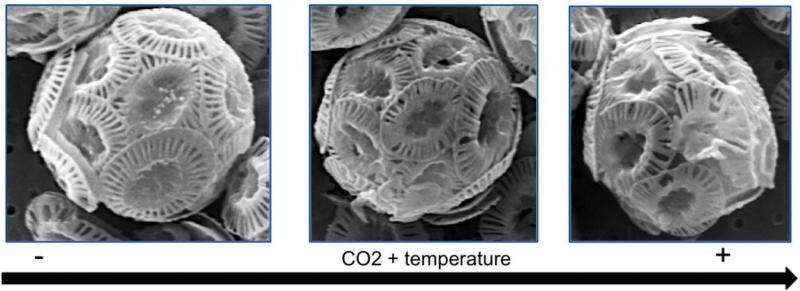Ocean warming and acidification impact on calcareous phytoplankton and reduce its ability to sequester atmospheric CO2

Researchers from the Institute of Environmental Science and Technology of the Universitat Autònoma de Barcelona (ICTA-UAB), the University of Cambridge and the Marine Biological Association of the United Kingdom warn of the negative impacts of rapid ocean warming and ocean acidification on coccolithophores, and consequently in the regulatory processes of atmospheric and ocean concentrations of carbon dioxide (CO2).
Two new studies recently published in Limnology & Oceanography and Biogeosciences report that ocean warming may exacerbate the impacts of ocean acidification on calcareous phytoplankton, and its evolutionary success and physiological performance will be hampered.
The oceans have absorbed more than a quarter of the human-made carbon dioxide (CO2) in the last century, changing the chemistry of the ocean and resulting in 'ocean acidification'. A rise in average temperatures is also warming the sea surface. The risks posed by warming and acidification are expected to become more acute in the next decades, as CO2 emissions into the atmosphere are increasing.
Coccolithophores is a very abundant calcifying phytoplankton group which plays a major role in the biogeochemical cycle and in the regulation of the global climate. These tiny algae which measure less than one hundredth of a millimeter "form the basis of the aquatic trophic chain, and through calcification and photosynthesis coccolithophores regulate atmospheric and oceanic CO2 levels", says Dr Patrizia Ziveri, ICREA researcher at ICTA-UAB and author of the study. The effects of acidification - and in particular warming - are rarely considered for the organism itself, and there is very little knowledge on how warming and acidification combined may affect the physiological performance or evolutionary success of coccolithophores.
Therefore, it was the aim of the team to investigate not only how temperature affects the impact of acidification on the cocolithophores, but also on the sinking rate and coccolithophores morphogenesis. A culture experiment was conducted on Mediterranean Sea and North Pacific Ocean strains of Emiliania huxleyi, the most abundant coccolitophore species.
Using scanning electron microscope (SEM) imaging, the researchers show in their study that there will be an increase in the percentage of malformed and incomplete coccoliths in a warmer and more acidified ocean. This will hamper the evolutionary success of these calcifiers and their role in regulating atmospheric carbon.
Since coccolithophores need to stay in the photic zone of the oceans, their sinking velocity affects their survival rate. Nothing is known about the response of coccolithophores to acidification and warming in terms of sinking rate, because it had been impossible to estimate sinking rate in the framework of a typical laboratory experiment. The team used a novel approach to calculate sinking rate from cell-architecture and showed that an increase in temperature will lead to an increase in sinking rate. Hence, the faster sinking for the organism itself has an impact on future global carbon cycling and therewith on atmospheric levels of CO2 and global climate.
More information: Sara Milner et al. Ocean warming modulates the effects of acidification oncalcification and sinking, Limnology and Oceanography (2016). DOI: 10.1002/lno.10292
Provided by Universitat Autonoma de Barcelona


















